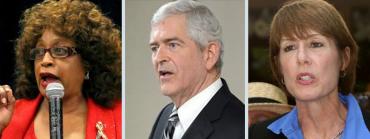
Florida politics got a whole lot more interesting last week as the Legislature ended a special session without agreeing on new congressional districts. The next few days should offer some clarity on where things go from here. Rick Scott could call a special session and have the Legislature try again. The Florida Supreme Court, which ruled against the old districts and mandated the special session, could wind up creating the new districts.
In the meantime, all 27 members representing Florida in the U.S. House have to wait. So do already declared and potential congressional challengers, the parties, PACs, powerbrokers, groups and anyone else with an interest in the races.
Incumbents who looked doomed under the Legislature’s base map -- namely Gwen Graham and Dan Webster -- aren’t out of the woods quite yet. Nor are other representatives who would have been hurt by the base map like Corrine Brown. It’s certainly possible the final congressional districts, no matter who draws them up, end up close to the base map.
Some representatives and candidates will have to introduce themselves to new voters once redistricting is finalized. Time is not on their side as the congressional primaries are less than a year away. Voters across Florida can expect a mad dash as the campaign cycles are sped up accordingly.
But the now abbreviated congressional elections are only one of the political dramas that Florida will see next year. In the Republican presidential primary, Jeb Bush and Marco Rubio are both counting on winning the Florida primary in March. The other Republican candidates would love to defeat them or at least come close to beating them in Florida. At the very least, Donald Trump, Ted Cruz, Scott Walker, Ben Carson and the other candidates wouldn’t mind Bush and Rubio forced to commit resources to protect their home turf instead of sending them to other states. On the Democratic side, Hillary Clinton might have the edge in Florida but she is losing steam and perhaps a major primary challenger could make her work to win here. Of course, Florida is expected to be, once again, one of the key states in the presidential election with 29 electoral college votes at stake.
Rubio’s presidential effort opens up a Senate seat. Voters aren’t familiar with the major candidates who are already off and running for the Senate, setting up competitive primaries a year from now and, in all likelihood, a competitive general election battle in November.
There’s already plenty of talk about proposed state constitutional amendments next year. Medical marijuana should once again be on the ballot. So could proposals about solar power, toll roads, mandatory sick leave and minimum wage.
And there’s more to come. The Legislature holds yet another special session on redistricting starting in October, this time focused on redoing the Florida Senate districts. Just like the congressional contests, this will result in plenty of politicians forced to campaign with a condensed time table.
Florida was already headed for an interesting election next year -- and it’s only going to get more dramatic as the clock ticks down to next November, even with redistricting still up in the air.
Tallahassee political writer Jeff Henderson wrote this analysis exclusively for Sunshine State News.


